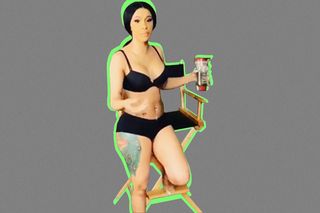
Jameela Jamil Reminds Us of the Hypocrisy in Celebrity Endorsements
“I hope all these celebrities shit their pants in public.”

Over the weekend, the delightfully straightforward Jameela Jamil made clear her thoughts on Cardi B’s new endorsement of Teami, a weight-loss tea: “I hope all these celebrities all shit their pants in public, the way the poor women who buy this nonsense upon their recommendation do. Not that they actually take this shit. They just flog it because they need MORE MONEY.”
On her i_weigh account, Jamil also called out Khloe Kardashian for endorsing weight loss products of dubious merit: Flat Tummy Shakes. Both Teami and Flat Tummy Shakes specifically target young women through their branding, packaging, and marketing. They are products that create and then exploit exactly the type of self-loathing anxiety that tethers even the most well-adjusted and self-confident women to lifelong feelings of insecurity and helplessness about their physical appearances. They’re also really bad for you.
But why should anyone famous worry about all that?
Well, first of all, it’s just plain hypocrisy for celebrities to endorse products that run counter to their own personal brands, and the fan base who fueled their celebrity rise. Khloe Kardashian and Cardi B are icons for showing a waif-worshipping world that curvy is beautiful. For them to embrace and sell a product that undermines precisely what their fans love them for feels like a naked bait-and-switch. And what about the women of color — from Blac Chyna to Aishwarya Rai to Kareena Kapoor — who have endorsed skin-lightening products? These women have profited from appealing to women of color, only to turn around and embrace a product that literally tries to whiten them.
The ultimate hypocrisy lies, of course, in the fact that these celebrities’ looks have absolutely nothing to do with the products they’re hawking. Regardless of what you think of their “new” bodies, Cardi B and Khloe have probably lost weight, ironically, the old-fashioned way: though a consistent and rigorous exercise routine, accompanied by a low-calorie, healthy diet. They employ entire teams of people to help them lead healthy lifestyles so they can look a certain way… just to turn around and sell that look (to people without those resources) as the immediate result of drinking a shake. And most female celebrities hired to endorse skin-lightening products were simply born with comparatively naturally lighter skin colors.
They are selling a lie.
Article continues below
Second, it’s particularly distasteful that these women are selling their fans — the people who buy their records and makeup, watch their shows — products that will make them sick. As Jamil pointed out, “These weight loss products like Flat Tummy Co, don’t make you thinner. They make you shit. They give you diarrhea, which then gives you a flatter tummy for a day. THAT’S ALL… It’s not safe. It’s not FDA approved. No doctors advise you to use this stuff.”
Celebrities exist to sell their fans a fiction, a taste of a reality that doesn’t exist. Using that star power to sell products that capitalize on the fiction they’ve built is not the problem; that is literally their job. But usually, the celebrity-fan relationship is symbiotic: celebrities create a personal brand identity that fans relate to and look up to, which leads them to buy more records/products/concert tickets, which allows the celebrity to continue perpetuating this fictional personal brand, in an endless loop of mutually beneficial pretend. But selling your fans something that’s actively bad for them is just parasitic.
Female celebrities are constantly in dialogue with their fans and society about the nature and meaning of female beauty. They have an opportunity to expand our definitions of beauty, and make them more inclusive — but doing so requires them to put their money where their mouths are, that is, to not take endorsements that peg beauty ideals to white skin and thin bodies. When they choose to cash in on tired stereotypes, they squander an opportunity to use their power effectively.
Ultimately, though, we, the consumers, are the ones with the power, because we’re the ones holding the cash that everyone — the brands, the celebrities — wants. If we decide we don’t like the skinny, white fiction we’re being sold, we have a surefire way of telling our celebrity icons where they can stick their laxatives: straight in the toilet.
Related


Grey’s Anatomy’s Ellen Pompeo Stops an Interview to Demand a More Diverse Hollywood
